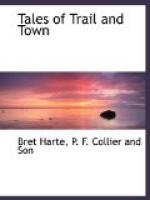Peter permitted himself to be led to the group. Even at that moment he remembered the figure of the Indian on the tomb at Ashley Grange, and felt a slight flash of satisfaction over the superior height and bearing of Gray Eagle.
“How!” said Gray Eagle. “How!” said the other four chiefs. “How!” repeated Peter instinctively. At a gesture from Gray Eagle the interpreter said: “Let your friend stand back; Gray Eagle has nothing to say to him. He wishes to speak only with you.”
Peter’s friend reluctantly withdrew, but threw a cautioning glance towards him. “Ugh!” said Gray Eagle. “Ugh!” said the other chiefs. A few guttural words followed to the interpreter, who turned, and facing Peter with the monotonous impassiveness which he had caught from the chiefs, said: “He says he knew your father. He was a great chief,—with many horses and many squaws. He is dead.”
“My father was an Englishman,—Philip Atherly!” said Peter, with an odd nervousness creeping over him.
The interpreter repeated the words to Grey Eagle, who, after a guttural “Ugh!” answered in his own tongue.
“He says,” continued the interpreter with a slight shrug, yet relapsing into his former impassiveness, “that your father was a great chief, and your mother a pale face, or white woman. She was captured with an Englishman, but she became the wife of the chief while in captivity. She was only released before the birth of her children, but a year or two afterwards she brought them as infants to see their father,—the Great Chief,—and to get the mark of their tribe. He says you and your sister are each marked on the left arm.”
Then Gray Eagle opened his mouth and uttered his first English sentence. “His father, big Injin, take common white squaw! Papoose no good,—too much white squaw mother, not enough big Injin father! Look! He big man, but no can bear pain! Ugh!”
The interpreter turned in time to catch Peter. He had fainted.
CHAPTER III
A hot afternoon on the plains. A dusty cavalcade of United States cavalry and commissary wagons, which from a distance preserved a certain military precision of movement, but on nearer view resolved itself into straggling troopers in twos and fours interspersed between the wagons, two noncommissioned officers and a guide riding ahead, who had already fallen into the cavalry slouch, but off to the right, smartly erect and cadet-like, the young lieutenant in command. A wide road that had the appearance of being at once well traveled and yet deserted, and that, although well defined under foot, still seemed to disappear and lose itself a hundred feet ahead in the monotonous level. A horizon that in that clear, dry, hazeless atmosphere never mocked you, yet never changed, but kept its eternal rim of mountains at the same height and distance from hour to hour and day to day. Dust—a parching alkaline powder that cracked




